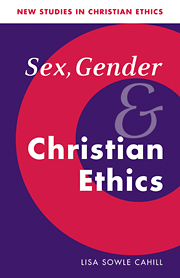Book contents
- Frontmatter
- Contents
- General editor's preface
- Acknowledgments
- 1 Sex, gender, and the problem of moral argument
- 2 Feminism and foundations
- 3 Particular experiences, shared goods
- 4 “The body” – in context
- An interlude and a proposal
- 5 Sex, gender, and early Christianity
- 6 Sex, marriage, and family in Christian tradition
- 7 The new birth technologies and public moral argument
- Concluding reflections
- Notes
- Index
- New Studies in Christian Ethics
Concluding reflections
Published online by Cambridge University Press: 05 June 2012
- Frontmatter
- Contents
- General editor's preface
- Acknowledgments
- 1 Sex, gender, and the problem of moral argument
- 2 Feminism and foundations
- 3 Particular experiences, shared goods
- 4 “The body” – in context
- An interlude and a proposal
- 5 Sex, gender, and early Christianity
- 6 Sex, marriage, and family in Christian tradition
- 7 The new birth technologies and public moral argument
- Concluding reflections
- Notes
- Index
- New Studies in Christian Ethics
Summary
In the modern period, both Roman Catholic and Protestant ethics have defined sexual morality primarily in terms of commitment and intersubjectivity, a move made possible by the modern recognition of the worth of individuals and the emergent social equality of women. However, a postmodern reticence about moral foundations has made it difficult for many social critics – Christian and otherwise – to argue convincingly that equality, reciprocity, and respect should function as crosscultural norms. Moreover, liberal assumptions about the priority of freedom have made it equally hard to complement the importance of these values with a more complete consideration of human embodiment, its social dimensions, and its function in defining human goods and suggesting human moral values. The aim of this study has been to propose contributions that a Christian perspective on sex and gender can make to cultural debates about women's equality and sexual meaning, while reinforcing the sort of ethical foundations which are hospitable to moral criticism and consensus-building across moral and cultural traditions.
The Roman Catholic tradition in Christianity has persevered in its commitment to embodiment and sociality as important parameters of sexual meaning, and as defining the institutions (marriage and family) in which women's and men's sexuality and parenthood have been realized historically and cross-culturally. The Roman Catholic commitment to (provisional) objectivity in moral evaluation; and to the ideal unity of sexual expression, sexual pleasure, commitment of partners, and shared parenthood, can contribute to a more complete Christian ethics of sex as an embodied and social reality.
- Type
- Chapter
- Information
- Sex, Gender, and Christian Ethics , pp. 255 - 257Publisher: Cambridge University PressPrint publication year: 1996

